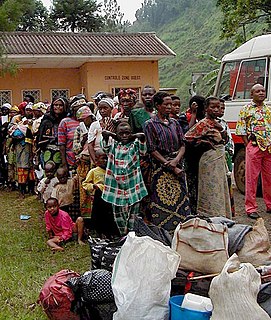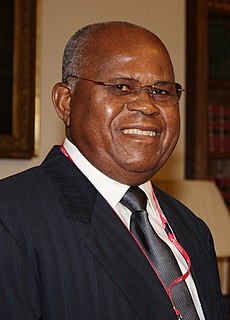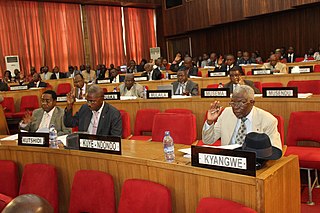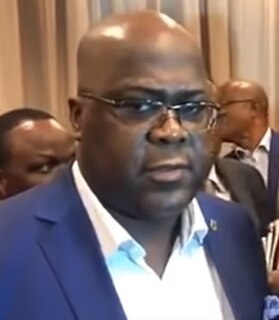The region that is now the Democratic Republic of the Congo was first settled about 80,000 years ago. The Kingdom of Congo remained present in the region between the 14th and the early 19th centuries. Belgian colonization began when King Leopold II founded the Congo Free State, a corporate state run solely by King Leopold. Reports of widespread murder and torture in the rubber plantations led the Belgian government to seize the Congo from Leopold II and establish the Belgian Congo. Under Belgian rule numerous Christian organizations attempted to Westernize the Congolese people.

Politics of the Democratic Republic of Congo take place in a framework of a republic in transition from a civil war to a semi-presidential republic.

Zaire, officially the Republic of Zaire, was the name of a sovereign state between 1971 and 1997 in Central Africa that is now known as Democratic Republic of the Congo. The country was a one-party totalitarian dictatorship, run by Mobutu Sese Seko and his ruling Popular Movement of the Revolution party. Zaire was established following Mobutu's seizure of power in a military coup in 1965, following five years of political upheaval following independence known as the Congo Crisis. Zaire had a strongly centralist constitution, and foreign assets were nationalised. The period is sometimes referred to as the Second Congolese Republic.

Laurent-Désiré Kabila, or simply Laurent Kabila, was a Congolese revolutionary and politician who served as the third President of the Democratic Republic of the Congo from May 17, 1997, when he overthrew Mobutu Sese Seko, until his assassination by one of his bodyguards on January 16, 2001. He was succeeded eight days later by his 29-year-old son Joseph.

The Second Congo War began in the Democratic Republic of the Congo in August 1998, little more than a year after the First Congo War, and involved some of the same issues. The war officially ended in July 2003, when the Transitional Government of the Democratic Republic of the Congo took power. Although a peace agreement was signed in 2002, violence has continued in many regions of the country, especially in the east. Hostilities have continued since the ongoing Lord's Resistance Army insurgency, and the Kivu and Ituri conflicts.

Direct elections in the Democratic Republic of the Congo occur for the Presidency, National Assembly, and provincial assemblies. The Senate, the upper house of the legislature, is elected indirectly by members of the provincial assemblies.

Étienne Tshisekedi wa Mulumba was a Congolese politician and the leader of the Union for Democracy and Social Progress (UDPS), the main opposing political party in the Democratic Republic of the Congo (DRC). A long-time opposition leader, he served as Prime Minister of the country on three brief occasions: in 1991, 1992–1993, and 1997.

General elections were held in the Democratic Republic of the Congo on July 30, 2006, the first multiparty elections in the country in 41 years. Voters went to the polls to elect both a new President of the Republic and a new National Assembly, the lower-house of the Parliament.

Moïse Katumbi Chapwe is a Congolese politician and businessman. He was the Governor of the Katanga Province, located in the southern part of the Democratic Republic of the Congo, from 2007 to September 2015. He was a member of the People's Party for Reconstruction and Democracy (PPRD) until September 2015. He has been described by The Economist as "probably the second most powerful man in the Democratic Republic of Congo after the president, Joseph Kabila". Jeune Afrique named him "African of the Year" in 2015.
Simon Mbatshi Batshia is a politician from the Democratic Republic of the Congo. He was the Governor of Bas-Congo province from February 2007 to March 2012, when he was elected as a deputy to the National Assembly. Batshia is also a consultant in conflict resolution at the Centre for Conflict Resolution, based in Cape Town, South Africa, and is a member of the South African Institute for International Affairs.

Presidential and parliamentary elections were held in Democratic Republic of the Congo on 28 November 2011; a facultative run-off on 26 February 2012 was shelved with a change in election laws.
Jonas Mukamba Kadiata Nzemba is a politician from the Democratic Republic of the Congo and former CEO of the state-run diamond company.
The Rally for Congolese Democracy–Goma was a faction of the Rally for Congolese Democracy, a rebel movement based in Goma, Democratic Republic of the Congo (DRC) during the Second Congo War (1998–2003). After the war, some members of the group continued sporadic fighting in North Kivu. The movement also entered mainstream politics, participating in democratic elections with little success.

Elections were held in the Democratic Republic of the Congo for 108 seats of the country's Senate on 14 March 2019. Former DRC President Joseph Kabila, who stepped down from office in January 2019 following the inauguration of the recently elected Félix Tshisekedi, has also joined the upper house of the legislature as a senator for life, for a total of 109 seats.
The following lists events that happened during 2012 in the Democratic Republic of the Congo.

On 19 January 2015, protests led by students at the University of Kinshasa broke out in the Democratic Republic of the Congo. The protests began following the announcement of a proposed law that would allow the country's 43-year-old president, Joseph Kabila, to remain in power until a national census could be conducted. Elections had been planned for 2016 and a census would be a massive undertaking that would likely take several years for the developing country.

General elections were held in the Democratic Republic of the Congo on 30 December 2018, to determine a successor to President Joseph Kabila, as well as for the 500 seats of the National Assembly and 715 provincial council seats. It was announced on 10 January 2019 that Félix Tshisekedi (UDPS) won with 38.6% of the vote, defeating another opposition candidate, Martin Fayulu, and Emmanuel Ramazani Shadary, backed by the ruling party PPRD. Fayulu alleged that the vote was rigged against him in a deal made by Tshisekedi and outgoing President Kabila, challenging the result in the DRC's Constitutional Court. Different election observers, including those from the country's Roman Catholic Church, also cast doubt on the official result. Nonetheless on 20 January the Court rejected his appeal and declared Tshisekedi as the winner. Parties supporting President Kabila won the majority of seats in the National Assembly. Félix Tshisekedi was sworn in as the 5th President of the Democratic Republic of the Congo on 24 January 2019, making it the first peaceful transition of power in the country since it became independent from Belgium in 1960.

On 20 December 2016 the Democratic Republic of the Congo's president, Joseph Kabila, announced that he would not leave office despite the end of his constitutional term. Protests subsequently broke out across the country, which has never had a peaceful transfer of power since it gained independence in 1960. The protests were met with the government's blocking of social media, and violence from security forces which left dozens dead. Foreign governments condemned the attacks against protesters.

Gubernatorial elections took place in 20 out of the 21 provinces of the Democratic Republic of the Congo on 26 March 2016. The elections were the first to take place since the Congolese government has fragmented the former 11 provinces into 26 as mandated by the DRC constitution, though by the time elections occurred only 21 provinces had completed the reform process. In most of the provinces, the elected governors are members or affiliates of the Alliance of the Presidential Majority.












